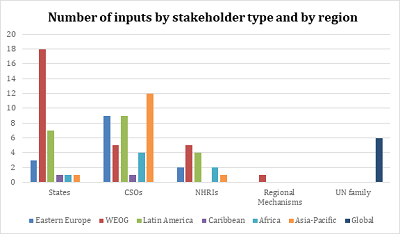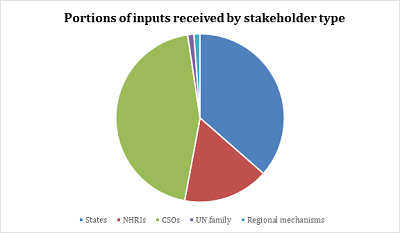Report on data collection and management
Issued by
Independent Expert on sexual orientation and gender identity
Published
14 May 2019
Issued by
Independent Expert on sexual orientation and gender identity
Published
14 May 2019
Issued by Special Procedures
Subjects
Sexual orientation and gender identity, Big data
Symbol Number
A/HRC/41/45
Reader-friendly summary
English:
In May 2018, a group of United Nations and international human rights experts expressed concern that LGBT people were being left behind. To remedy this, actions would be needed “to tear down the systematic barriers that exclude LGBT persons from the benefits of the development agenda.” The experts pointed out the need for data, and the need to ensure that data collection and management would be in line with human rights standards.
Currently, there are serious gaps in available data to capture the lived realities of LGBT people. Prejudice and criminalization may result in non- or under-reporting of violence and discrimination based on sexual orientation and gender identity. Similarly, some States deny the existence of violence and discrimination against LGBT people, or even of the presence of LGBT persons, in their jurisdiction.
Data is crucial to creating visibility and building an evidence base of human rights abuses and potential responses. Having accurate data would provide evidence of the extent of the challenges faced by the LGBT population, and of the policy and legislative needs in that regard. It would also help dispel myths and stereotypes that feed stigma and discrimination. Further, it would also help policy-makers and advocates to draft State measures for socio-economic inclusion, access to health and education, inclusion in the civic and political sphere, anti-discriminatory measures, prevention of abuses, and access to justice.
On the other hand, collecting data about sexual orientation and gender identity raises concerns about privacy, identity, self-determination, and security. Information about an individual’s sexuality and gender continues to be highly stigmatizing. In countries where same-sex sexual conduct is criminalized, where laws and policies are used to discriminate against or persecute LGBT persons, or where stigma and prejudice are rampant, victims will be much less likely to report abuses. This is due to fear of prosecution, stigma, reprisals or victimization, unwillingness to be “outed”, or lack of trust. Even in progressive environments, the worry of regression may lead to non- or under-reporting. In addition, there is currently no globally-accepted definition, or international classification scheme, to facilitate internationally comparable data between subpopulations according to sexual orientation and gender identity.


Member States
National Human Rights Institutions, Equality Bodies and Ombudspersons
Civil Society Organisations and defenders
United Nations Agencies, Funds and Programs
VIEW THIS PAGE IN: